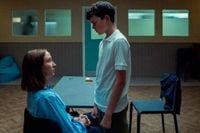In a striking family discussion, a 15-year-old boy named Ben and his parents, Sophie and Martin, dissected the Netflix drama "Adolescence," which has sparked intense conversations about the impact of social media on youth. The series follows Jamie, a 13-year-old boy accused of murdering a female peer, and delves into themes of misogyny and cyberbullying, raising concerns among parents about their children's online experiences.
During their conversation, which took place on March 29, 2025, the family reflected on the show's portrayal of the so-called "manosphere"—a collection of online communities promoting misogyny and incel culture. Surprisingly, Ben admitted he was unfamiliar with the term "incel," which stands for involuntary celibate, indicating a shift in youth language and awareness. He shared that, in his school, peers often refer to each other as "virgins" instead.
Ben's parents, both in their 40s and professionals, expressed their worries regarding the content Ben consumes online. They believe that the series resonates with their experiences as parents navigating the complexities of their son's digital life. "It's just weird to talk about your sexual feelings to your parents," Ben remarked, highlighting the awkwardness many teens feel discussing such topics.
Ben, who is well-liked at his single-sex school, acknowledged the show's depiction of school life, including bullying and fights, but felt it only presented a "rough picture" of teenagerhood. He argued that it failed to capture the positive aspects of social media, stating, "It neglects to show the good side of social media alongside its dangers." His father, Martin, echoed these sentiments, suggesting that the show sometimes prioritizes drama over realism to shock parents into action.
The discussion turned to Andrew Tate, a controversial figure in the online world, who was mentioned in the series. Ben noted that while Tate was once popular at his school, he is now considered "old news." He also pointed out how Tate mixes health advice with far-right ideologies, saying, "Some of his things, like 'exercise for an hour a day' – fair enough, that's correct. But then he combines it with far-right ideas, like 'the man should go out and work and the wife should stay at home.'" This reflection led to a broader conversation about the societal issues surrounding misogyny.
As the family explored the dynamics of male-female friendships in the context of the show, Sophie expressed concern that Ben's interactions with girls are limited and often influenced by social media. She asked him where he would turn for help if he felt awkward talking to girls. Ben admitted he often seeks advice online, including using ChatGPT and TikTok. This exchange highlighted the challenges young people face in navigating relationships in a digital age.
In the series, a pivotal moment occurs when Jamie's victim, Katie, is subjected to bullying after intimate images of her are shared without consent. Ben shared that he has witnessed similar incidents among his peers, recalling a case where a boy's private photo was leaked in a group chat. He identified pornography as a significant issue among his friends, stating, "They rely on it. There are people in my year who'll have such a bad day unless they watch it." This acknowledgment underscores the pressing concerns surrounding young people's exposure to explicit content.
Martin and Sophie believe that providing children with opportunities to engage in society and build self-esteem is crucial in combating the negative influences of the digital world. They emphasized the importance of male role models for Ben, who praised his sports coaches for their strong morals. However, they also recognized the challenges of affording extracurricular activities, which can disadvantage students from lower-income families.
Sophie pointed out that the character Jamie lacks positive outlets, saying, "He doesn't have sport. He doesn't feel good about himself. His dad looks away when he fails." This observation led to a consensus that children with limited opportunities are more vulnerable to the harmful messages propagated by misogynistic influencers.
Both parents stressed that addressing these issues requires a collective effort from tech companies, schools, families, and the government. They believe that parents cannot shoulder this responsibility alone. "It's a tsunami and someone's given me an umbrella," Sophie remarked, encapsulating the overwhelming nature of the challenges they face.
Ben concluded the discussion by asserting that online experiences should be treated as real life, stating, "What happens online is too often dismissed by adults as being irrelevant to the real world." This perspective emphasizes the need for adults to engage with and understand the digital environments that shape their children's lives.
The series "Adolescence," co-created by Stephen Graham, has become a focal point for discussions about the intersection of youth culture and technology. Its portrayal of incel culture and the consequences of misogyny has ignited debates among parents, educators, and mental health professionals alike. As the conversation continues, families like Ben's are navigating the complexities of modern adolescence, striving to foster open communication and understanding in an increasingly digital world.






